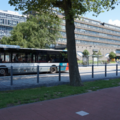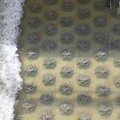Latest news
22 August 2024
Seamless transfers from public transport to shared mobility in Rotterdam

How do you get people out of the car? The alternative should be a seamless, comfortable and affordable journey. A case study with the public transport provider RET in Rotterdam has now progressed to the point where travellers will soon be able to plan their multimodal trip through their app, including bus, tram and metro combined with micromobility services. A TU Delft research team has designed a short-term forecasting algorithm to predict demand and micromobility fleet availability (like shared bikes and e-scooters of Check, Tier, NS and more) in real-time. Multimodal trips are then designed taking the available resources into account that will be incorporated in a single app. This way, researchers from the Seamless Shared Urban Mobility project hope to attract travellers in Rotterdam who might doubt using multimodal trips due to uncertainty on the availability of micromobility fleet as part of their trip plan.
09 August 2024
The underground of the zoo

Elephants, monkeys, giraffes, polar bears and lions, BSc student Karian Bruyndonckx enjoys the company of these creatures on her daily lunchtime stroll through the zoo. But while other visitors admire the animals, Karian sees something entirely different. She has a unique perspective on the zoo, one that reaches deep beneath the surface…
19 July 2024
Scale model of Indian Ocean island allows scientists to assess the impact of rising sea levels

19 July 2024
Fourteen promising young Delft researchers receive Veni grant

The Dutch Research Council (NWO) has awarded thirteen young TU Delft researchers from the Science (ENW) and Applied and Engineering Sciences (TTW) domains, a Veni grant of up to 320,000 euro.
19 July 2024
Pinpointing the weak spot in a masonry building

TU Delft researchers are investigating how best to strengthen houses against earthquake damage. Francesco Messali aims to pinpoint more precisely where the vulnerable spot is. This could yield gains in reinforcing houses faster and more efficiently, avoiding unnecessarily extensive and costly interventions.
17 July 2024
A better picture of the subsurface thanks to data assimilation

Max Ramgraber, geowetenschapper bij de TU Delft, ontvangt een NWO Veni-beurs om de ondergrond beter in kaart te brengen. Informatie over de vaak lastig bereikbare diepte zijn schaars, en gaan vaak gepaard met statistische onzekerheid. Daarom werkt Ramgraber aan een statistische methode waarbij hij verschillende, vaak complexe, data combineert.
17 July 2024
Revealing coastal sediment pathways
